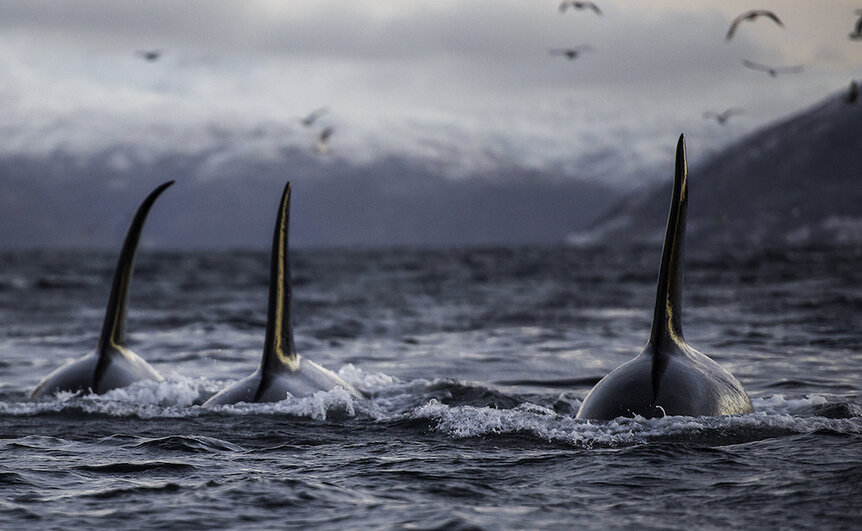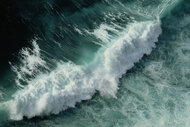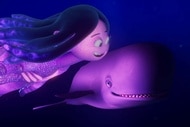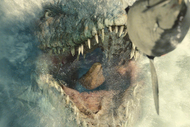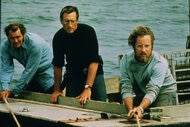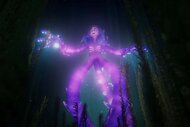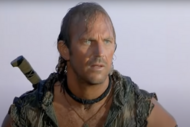Create a free profile to get unlimited access to exclusive videos, sweepstakes, and more!
Why Don't Killer Whales Ever Attack and Kill Humans?
Because they totally could, and maybe even should.
Director Steven Spielberg’s 1975 summer blockbuster Jaws cemented the great white shark as the most ferocious creature in the sea, in the minds of the movie-going public. The only trouble is, it isn’t true. While white sharks are incredible predators streamlined over more than 400 million years of evolution, they are only second best when it comes to aquatic killers. The top spot for undisputed ocean faring apex predator goes to the killer whale.
If you trace the ocean food web from top to bottom, it ends with the orca every single time. Even white sharks tremble at the sight of killer whales and flee the area when they arrive. Despite all that, we think of orcas as almost cute. We don’t give them the terrified respect they deserve, and that might be because, when we stop to think of it, we can’t think of a single time that a killer whale actually attacked a human in the wild. What gives?
Why Don’t Orcas Attack Humans?
They do, sometimes, just not very often and only under specific circumstances. It’s true that they tend to avoid us and attacks don’t happen nearly as often as they could. In recent years, orcas have even taken to attacking boats, sinking them, and depositing their passengers into the drink. Those passengers suddenly find themselves face to face with the world’s leading oceanic predator and yet, there haven’t been any deaths.
Orcas seem content to sink boats and swim away having proven their point. The vast majority of human-orca violence is perpetrated by us, and those few instances in which an orca was the aggressor almost always happen in captivity. The question of why they don’t attack us when they could, and maybe even should, will likely never be fully answered. We’re dealing with an intelligent animal carrying generations of embedded culture, and we can’t talk to them.
For More on Killer Whales:
A South African Killer Whale Took on a Great White Shark One-on-One and Won
Killer Whales Turn the Tide and Start Hunting Boats
Newly Discovered Rogue Orcas are Hunting in the Open Ocean
It might be a simple question of taste. When compared with blubber-rich marine mammals and tasty fresh fish, we might not have much to offer to the orca palate. That said, orcas are known for their ability to adapt to new environments and work together to hunt challenging prey. If orcas wanted to hunt us, there’s no reason they couldn’t pull it off. It seems like if there’s easy food on offer, they should take it, but they don’t.
Taste is probably one factor, but the larger influence is likely cultural. Orcas are well known for engaging in shared cultural practices including wearing fish as hats, teaching one another to steal from fishing boats, and the aforementioned sinking of yachts. It’s possible that orcas simply have a cultural rule against eating humans. It’s certainly not unheard of among killer whales.
While all killer whales are considered one species (for now, there has been recent conversation about splitting them into separate species or subspecies) they can be differentiated by physical characteristics like fin shape, size, and saddle patches, and by behavior. Each group specializes on a specific diet which rarely overlaps. There are some which eat only fish, others which eat only marine mammals, and some which are more general hunters. In some instances, fish-only orcas have been seen playing with and killing marine mammals but not eating them, even when their group is starving.
The leading explanation for why they would do that is a cultural taboo against eating marine mammals, even when it’s a suitable food source and you really need it. Something similar might be at work when it comes to humans. In 2005, a 12-year-old was swimming in Helm Bay when an orca rushed him. Observers reported that it looked like the animal was going to attack, then at the last minute it seemingly recognized he was human and “bent its body in half to flip around and go back out to sea,” reports Newsweek.
"I don’t think a killer whale would ever hunt a human. They are fussy eaters, really conservative in terms of whatever they learned from their mothers and from their pod about what constitutes food," Erich Hoyt, author of Orca: The Whale Called Killer, told Live Science.
While orcas might have a cultural rule against eating humans, that might not say anything about their particular opinion of us. Orcas seem to have a strict diet defined by what their mothers feed them. If that’s the case, humans stay off the menu only because we’ve never been on the menu before. It’s probably in our interest to keep it that way, and that might mean giving orcas a little more breathing room to do their thing.
We really could have used their help back when Sheriff Brody and the gang were hunting Jaws, available from Universal Pictures.




